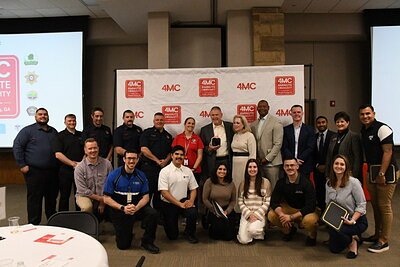
Beyond 911: How Citizen Volunteers & Tech Are Closing the Gap in Cardiac Arrest Survival
A new community-based emergency response model is empowering citizens and leveraging technology to dramatically improve survival rates for out-of-hospital cardiac arrest. Forsyth County, GA, leads the way.
Beyond 911: How Citizen Volunteers & Tech Are Closing the Gap in Cardiac Arrest Survival
FORSYTH COUNTY, GA – November 17, 2025 – In a life-or-death scenario where every second counts, a growing movement is challenging traditional emergency response systems. A pioneering program in Forsyth County, Georgia, is demonstrating how empowered citizens, equipped with advanced technology, can bridge the critical gap between a cardiac arrest event and the arrival of professional help, significantly boosting survival rates.
The Race Against Time: Understanding the Challenge
Out-of-hospital cardiac arrest (OHCA) remains a leading cause of death, with a staggering 90% mortality rate. The key to survival lies in immediate intervention – specifically, early defibrillation. However, traditional emergency medical services (EMS) response times often fall short, averaging around 7 minutes nationally, and extending much longer in rural areas. This delay drastically reduces the chances of a positive outcome. “The first few minutes are absolutely critical,” says a representative from a national emergency response organization. “Every minute without intervention decreases the likelihood of survival by 7-10%.”
The limitations of the current system spurred Avive Solutions, Inc., to develop a new approach – the ‘4 Minute Community’ program. This initiative connects trained citizen volunteers with advanced Automated External Defibrillators (AEDs) and integrates them into the 911 dispatch system. The goal? To get a life-saving device on-scene faster than ever before. “We recognized the need to compress that critical timeframe,” explains a spokesperson for Avive. “By empowering citizens and leveraging technology, we can dramatically improve outcomes.”
Forsyth County: A Model for Community-Based Emergency Response
Forsyth County, Georgia, became one of the first communities to fully embrace the ‘4 Minute Community’ model. The program, a collaborative effort between Avive Solutions, Northside Hospital, the Forsyth County Fire Department, and RapidSOS, strategically deploys Avive Connect AEDs with trained citizen volunteers, known as Cardiac Arrest Rapid Engagement (CARE) team members. When a 911 call comes in reporting a potential cardiac arrest, the RapidSOS platform identifies nearby CARE team members and alerts them via a mobile app. Simultaneously, 911 dispatchers are connected with the volunteer, providing guidance and real-time information.
On July 24, 2025, the program achieved its first successful resuscitation in Forsyth County. A citizen volunteer, trained and equipped through the program, responded to a cardiac arrest call and successfully used an Avive Connect AED to stabilize the patient before EMS arrived. “It was a textbook response,” says a member of the Forsyth County Fire Department. “The volunteer arrived on-scene within minutes and initiated life-saving measures, giving the patient a fighting chance.”
The success in Forsyth County isn’t an isolated incident. Similar programs are now active in communities across the country, including Cumberland County, Pennsylvania, Jackson, Tennessee, and Sandy Springs, Georgia. This rapid expansion highlights the growing recognition of the program’s potential to transform emergency response.
The Technology Behind the Response: RapidSOS and the Avive Connect AED
The effectiveness of the ‘4 Minute Community’ program relies heavily on the seamless integration of advanced technology. The Avive Connect AED is more than just a defibrillator; it’s a connected device that transmits real-time data to 911 dispatchers and first responders. The device's QuickRescue™ feature automatically transmits critical incident data, including the AED's location and the patient's status, allowing dispatchers to provide accurate guidance and prepare for the patient's arrival.
Crucially, this data transmission is facilitated by RapidSOS, a platform that connects emergency communications systems with vital data sources. RapidSOS enables 911 dispatchers to “see” the location of the AED and the volunteer, providing them with a comprehensive situational awareness. This integration not only speeds up response times but also improves the quality of care provided. “The ability to share real-time data is a game-changer,” says a representative from RapidSOS. “It allows us to provide a more coordinated and effective response.”
Northside Hospital has also been a significant supporter of the program, providing funding and expertise to ensure its success. The hospital’s foundation contributed $375,000 to deploy AEDs and train volunteers in Forsyth County, demonstrating a commitment to improving community health. “We believe this program has the potential to save countless lives,” says a spokesperson for Northside Hospital. “We are proud to be a part of it.”
The long-term sustainability of the ‘4 Minute Community’ program relies on continued investment and expansion. While a precise cost-benefit analysis is still underway, the potential economic and social benefits of improved cardiac arrest survival rates are substantial. Every life saved represents a significant gain for families, communities, and the healthcare system as a whole. The innovative approach being pioneered in Forsyth County – and replicated in communities across the nation – offers a promising path toward a more resilient and responsive emergency healthcare system.
